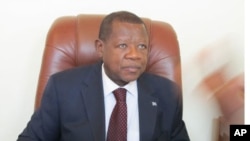The Democratic Republic of Congo’s information minister says his administration has proof that Rwandan soldiers and senior officers are directly engaged in combat operations inside his country.
"We are accusing them of implicating themselves in combat operations. We have evidence now that Rwandese soldiers and officers are directly implicated in combat operations in DRC," said Lambert Mende.
He acknowledges growing diplomatic tension between Kinshasa and Kigali following accusations that Rwanda has been supporting rebels fighting the Armed Forces of the Democratic Republic of Congo (FARDC) in the restive north Kivu province.
"We are already in [a state of] tension, and we have three [ways of dealing with issue]," Mende said. "There is a military [engagement] going on in the field [between the army and the rebels]. There is a political [approach that’s] mobilizing our people to resist aggression from neighboring countries. Then there are diplomatic contacts going on. We have not declared war on Rwanda, and that’s why we are using all the three ways of ending this aggression against our country."
Mende said the DRC government has warned Rwandan soldiers to leave the country.
"We have told them first of all to go back [home]. They have nothing to do in Congo," continued Mende. "Secondly, we have decided to get in touch with the [U.N] Security Council and the African Union [AU]… and by [Wednesday], we will have a very important discussion in Addis Ababa with all 11 countries that are part of the Great Lakes [region], including Rwanda, on the matter."
Kigali has often rejected accusations it is supporting rebels including a group of former solders called M23 fighting Congo’s army. Mende said Kigali pulled out of a joint task force that was investigating Kinshasa’s accusations.
"Our Rwanda partners got out of that joint team that was scrutinizing the evidence brought [up] by our officials. That’s when we went to the Security Council [where it is under discussion]," continued Mende. "We went also to the AU, and it will be part of the next summit among heads of state."
But in an interview with VOA, Rwanda’s foreign minister Louise Mushikiwabo said Kigali is cooperating with Kinshasa.
"One of the areas that Rwanda and Congo has worked very hard on after we normalized relations [is making] sure that we continue to talk - that our security and defense leaders meet often, talk often, work together, have joint operations in the region," continued Mushikiwabo.
"We also very much put time and value into security in both countries," she said. "We take security very seriously, and that is how Rwanda has been able to move away from insecurity and even to grow so much, economically."
Mende said the international community must work to stop hostile actions against Congo.
“We are repeating our call to all African countries to act to stop these [acts of] aggression by our neighbors. Secondly, we have asked the Security Council to apply international law against [any] country that is disrupting peace and security in this very fragile region,” said Mende.
"We are accusing them of implicating themselves in combat operations. We have evidence now that Rwandese soldiers and officers are directly implicated in combat operations in DRC," said Lambert Mende.
He acknowledges growing diplomatic tension between Kinshasa and Kigali following accusations that Rwanda has been supporting rebels fighting the Armed Forces of the Democratic Republic of Congo (FARDC) in the restive north Kivu province.
"We are already in [a state of] tension, and we have three [ways of dealing with issue]," Mende said. "There is a military [engagement] going on in the field [between the army and the rebels]. There is a political [approach that’s] mobilizing our people to resist aggression from neighboring countries. Then there are diplomatic contacts going on. We have not declared war on Rwanda, and that’s why we are using all the three ways of ending this aggression against our country."
Mende said the DRC government has warned Rwandan soldiers to leave the country.
"We have told them first of all to go back [home]. They have nothing to do in Congo," continued Mende. "Secondly, we have decided to get in touch with the [U.N] Security Council and the African Union [AU]… and by [Wednesday], we will have a very important discussion in Addis Ababa with all 11 countries that are part of the Great Lakes [region], including Rwanda, on the matter."
Kigali has often rejected accusations it is supporting rebels including a group of former solders called M23 fighting Congo’s army. Mende said Kigali pulled out of a joint task force that was investigating Kinshasa’s accusations.
"Our Rwanda partners got out of that joint team that was scrutinizing the evidence brought [up] by our officials. That’s when we went to the Security Council [where it is under discussion]," continued Mende. "We went also to the AU, and it will be part of the next summit among heads of state."
But in an interview with VOA, Rwanda’s foreign minister Louise Mushikiwabo said Kigali is cooperating with Kinshasa.
"One of the areas that Rwanda and Congo has worked very hard on after we normalized relations [is making] sure that we continue to talk - that our security and defense leaders meet often, talk often, work together, have joint operations in the region," continued Mushikiwabo.
"We also very much put time and value into security in both countries," she said. "We take security very seriously, and that is how Rwanda has been able to move away from insecurity and even to grow so much, economically."
Mende said the international community must work to stop hostile actions against Congo.
“We are repeating our call to all African countries to act to stop these [acts of] aggression by our neighbors. Secondly, we have asked the Security Council to apply international law against [any] country that is disrupting peace and security in this very fragile region,” said Mende.
